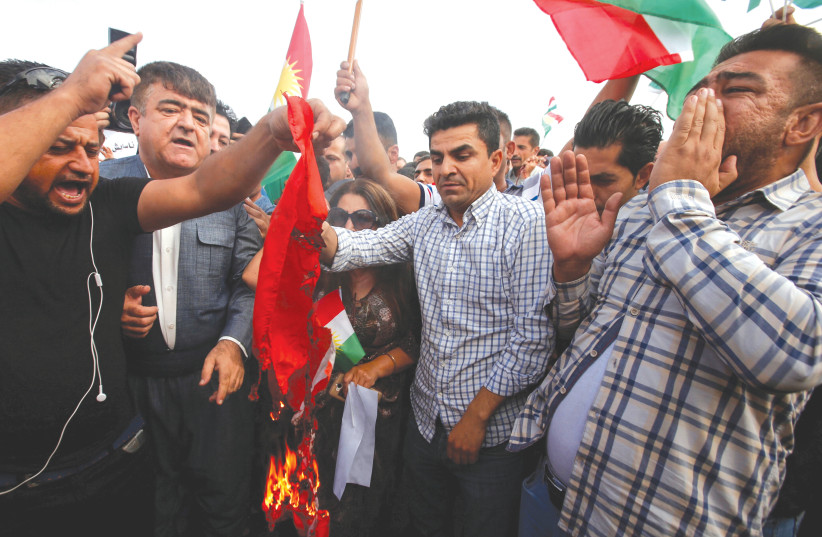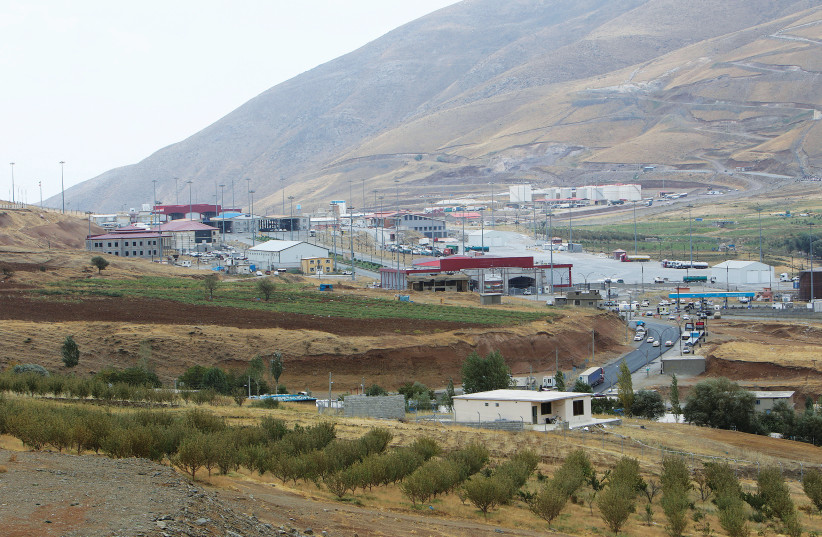BEHIND THE LINES: While no conclusions regarding the veracity of these claims can, at this stage, be drawn, the substantive issue at hand is whether they will even be investigated.
JONATHAN SPYERPublished: DECEMBER 23, 2021 21:05

On December 3rd, a stormy demonstration took place outside the headquarters of the Organization for the Prohibition of Chemical Weapons (OPCW) in the Hague. Some 40 to 50 demonstrators, most of them Kurds, were arrested. The demonstrators were demanding that the OPCW investigate allegations of use by Turkish forces of chemical weapons against Kurdish fighters in northern Iraq. The arrests were made after demonstrators managed to bypass security, and tried to enter the offices of the OPCW.
The protest was part of an ongoing effort by Kurds and their supporters to draw international attention to claims of ongoing use by Turkish forces in northern Iraq of banned chemical substances against fighters of the PKK (Kurdish Workers Party).
The attacks are alleged to have taken place within the framework of the Turkish military operation in Northern Iraq, dubbed “Operation Claw Lightning,” which began on April 23 of this year. This operation, centering on the Metina, Zap and Avashin-Basyan regions of Duhok and Erbil governorates, is an effort to secure an area of de facto Turkish control blocking the Kurdish area of control in Syria from the PKK heartland in the Qandil Mountains of northeast Iraq.
cnxps.cmd.push(function () { cnxps({ playerId: ’36af7c51-0caf-4741-9824-2c941fc6c17b’ }).render(‘4c4d856e0e6f4e3d808bbc1715e132f6’); });
What is the nature of these allegations? A report in late October on the pro-Kurdish ANF News website quoted PKK claims of a systematic campaign of chemical weapon use in the combat zone. The organization said that 323 attacks using chemical weapons took place over the first six months of the operation. The first use, the report asserted, was in the Gare area in February, 2021, prior to the launch of the main offensive. In this attack, it is claimed that six fighters were killed. Thirty-two additional fighters, the report asserts, were subsequently killed in chemical weapons attacks in Avashin, Metina and Zap. So, according to Kurdish claims, 38 fighters in total have died from use of chemical weapons in the first six months of Operation Claw Lightning.
What proof has been offered in support of the allegations? The KCK (Kurdish Communities Union), a Europe-based Kurdish body, has circulated a video showing what it says is the aftermath of a chemical attack in the Avashin region of Duhok Province on May 3, 2021. The clip, which KCK spokesman Zagros Hiwa said had previously been circulated on Turkish nationalist Whatsapp groups, shows the bodies of three PKK fighters, bearing no apparent wounds, after being dragged from a cave by Turkish soldiers.

THE BORDER between the Kurdistan Region of Iraq and Iran. (credit: REUTERS)
ANF has also released an additional video showing what it asserts to be footage of a gas being used by Turkish forces on June 8 against tunnels held by Kurdish fighters in the Werxele area. Another video, also apparently showing the use of a gas of some kind, was broadcast by the pro-Kurdish Medya News on October 10, 2021.
In addition, testimony of PKK fighters who survived what they describe as a chemical attack by Turkish forces has been circulating.
These accounts are, by themselves, not sufficient to prove the accuracy of claims of chemical weapon use. Turkey strongly rejects the accusations. In November, Turkish Defense Minister Hulusi Akar rejected the notion that Ankara even possesses weapons of this kind. “There is absolutely, and in no way, chemical weapons in the TAF (Turkish Armed Forces) inventory,” Akar said, according to a report by the Turkish Arti Gercek news site. “It is very easy to follow where chemical weapons are taken from, and to where they are taken. Such allegations are periodically repeated in order to tarnish the fight against terrorism, which is carried out in an honorable and transparent manner.”
Turkey is a signee of the Chemical Weapons Convention of 1997, which prohibits the use, development “stockpiling and transfer of chemical weapons.”
This denial notwithstanding, similar allegations have, nevertheless, repeatedly resurfaced over the last two decades regarding the claimed use of chemical weapons by Turkey against the Kurds. In 2019, an OPCW investigation into allegations that they had been used in the Ras al Ain/Sere Kaniye area of northern Syria was dropped after OPCW officials concluded that the substance used was “likely” white phosphorous, a substance not classed as a chemical weapon nor banned from use by armies in combat.
MURAT KARAYILAN, a senior PKK official, meanwhile, has named Tabun nerve gas, chloropicrin (also known as “green cross”) and mustard gas as the substances his organization asserts to have been used by the Turkish army in the course of the recent fighting in northern Iraq.
But while no conclusions regarding the veracity of these claims can, at this stage, be drawn, the substantive issue at hand is whether they will even be investigated. Kurdish voices are calling for an independent OPCW or UN-led investigation in northern Iraq to independently examine the issue. Nilufer Koc, a Europe based KNK official, told The Jerusalem Post that “we are calling on the OPCW to fulfil its obligation and investigate immediately the use of CW on the ground.”
A new Europe-based initiative, dubbing itself the “Coalition against Chemical Weapons in Kurdistan” was launched in late November, with the intention of organizing a high level delegation including medical experts to visit the region and gather evidence.
Official responses to the allegations remain cautious in the extreme, and no major state supported initiative looks imminent. Lord Ahmad, British minister of state for the foreign office, responded to a question on this subject in the British parliament on December 17 by noting that the British government was “monitoring the recent allegations of chemical weapons use in northern Iraq.” He went on to describe the allegations as “unsubstantiated.”
Kurdish sources in response told the Post that such allegations are likely to remain unsubstantiated in the absence of any effort to substantiate them. It appears unlikely, however, that any major initiative to investigate these allegations will emerge in the near future. For this to happen, pressure from a state or alliance of states in international bodies would be necessary. The PKK, against whom Turkey is engaged in northern Iraq, remains a proscribed organization on both the US and EU’s list of terrorist groups. A look at the record of recent years indicates that responses to allegations of this kind are a function of political interests and power brokerage, rather than any abstract legal principle. The Saddam Hussein regime in Iraq, which killed 5,000 Kurdish citizens in the Iraqi Kurdish town of Halabja in 1988, paid no price at the time for this act. Only later, after the Iraqi dictator invaded Kuwait, the matter of his use of chemical weapons became widely known.
The Assad regime in Syria, having ignored a US ultimatum against chemical weapons use in 2013, paid little substantive price for its subsequent employment of sarin gas. The OPCW confirmed Assad’s use of Sarin on a number of occasions in the course of the Syrian civil war. The absence of US and international will to enforce the US ‘red line” rendered it empty of substance.
Both these precedents appear to indicate that the truth of what happened in recent months in Metina, Zap and Avashin looks for the moment likely to remain unexplored, at least by official bodies. Turkey’s role as a NATO member, a US ally and not least as the potential dispatcher of migrants towards European shores seems likely to ensure this. Kurdish protests against this state of affairs, meanwhile, look similarly set to continue.
Content retrieved from: https://www.jpost.com/middle-east/article-689654.